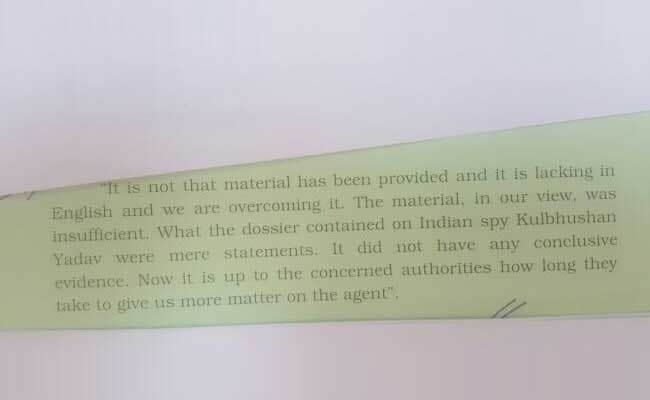
Sartaj Aziz, in December, told Pak senate there was insufficient proof against Kulbhushan Jadhav.
A Pakistani military court on Monday sentenced an Indian accused of espionage to death, ratcheting up the tension between the countries.
Pakistani authorities say Kulbushan Sudhir Jadhav, a former officer with the Indian Navy, was arrested in March 2016 in the turbulent province of Balochistan, which has seen a long-running conflict between Pakistani security forces and a militant separatist movement.
The Pakistani military said in a statement he had confessed to being tasked by India's intelligence service RAW (Research and Analysis Wing) with planning, coordinating and organising espionage and sabotage activities in Balochistan "aiming to destabilize and wage war against Pakistan".
The sentence was passed by a Field General Court Martial and confirmed by the powerful army chief General Qamar Javed Bajwa. The court-martial had reportedly been kept secret even within the ranks of the military.
But in December, Sartaj Aziz, who functions as Pakistan's Foreign Minister, told members of the country's senate that there was insufficient evidence presented of Mr Jadhav's alleged espionage. "What the dossier contained on Indian spy Kulbhushan Yadav were mere statements. It did not have any conclusive evidence." His explanation was offered as Pakistan deliberated how to build international opinion against India for allegedly instigating separatism in Balochistan.

India rejected Pakistan's account of Mr Jadhav's activities and summoned Pakistan's High Commissioner to underscore that no credible evidence had been presented against the 46-year-old.
In a statement, India also said that Mr Jadhav had been kidnapped in Iran and "his subsequent presence in Pakistan has never been explained credibly". It said he had been denied access to Indian consular officials despite repeated requests.
"If this sentence against an Indian citizen, awarded without observing basic norms of law and justice, is carried out, the government and people of India will regard it as a case of premeditated murder," it said.
Pakistani authorities did not say when the death sentence would be carried out.
Pakistani authorities say Kulbushan Sudhir Jadhav, a former officer with the Indian Navy, was arrested in March 2016 in the turbulent province of Balochistan, which has seen a long-running conflict between Pakistani security forces and a militant separatist movement.
The Pakistani military said in a statement he had confessed to being tasked by India's intelligence service RAW (Research and Analysis Wing) with planning, coordinating and organising espionage and sabotage activities in Balochistan "aiming to destabilize and wage war against Pakistan".
The sentence was passed by a Field General Court Martial and confirmed by the powerful army chief General Qamar Javed Bajwa. The court-martial had reportedly been kept secret even within the ranks of the military.
But in December, Sartaj Aziz, who functions as Pakistan's Foreign Minister, told members of the country's senate that there was insufficient evidence presented of Mr Jadhav's alleged espionage. "What the dossier contained on Indian spy Kulbhushan Yadav were mere statements. It did not have any conclusive evidence." His explanation was offered as Pakistan deliberated how to build international opinion against India for allegedly instigating separatism in Balochistan.

India rejected Pakistan's account of Mr Jadhav's activities and summoned Pakistan's High Commissioner to underscore that no credible evidence had been presented against the 46-year-old.
In a statement, India also said that Mr Jadhav had been kidnapped in Iran and "his subsequent presence in Pakistan has never been explained credibly". It said he had been denied access to Indian consular officials despite repeated requests.
"If this sentence against an Indian citizen, awarded without observing basic norms of law and justice, is carried out, the government and people of India will regard it as a case of premeditated murder," it said.
Pakistani authorities did not say when the death sentence would be carried out.
Track Latest News Live on NDTV.com and get news updates from India and around the world

